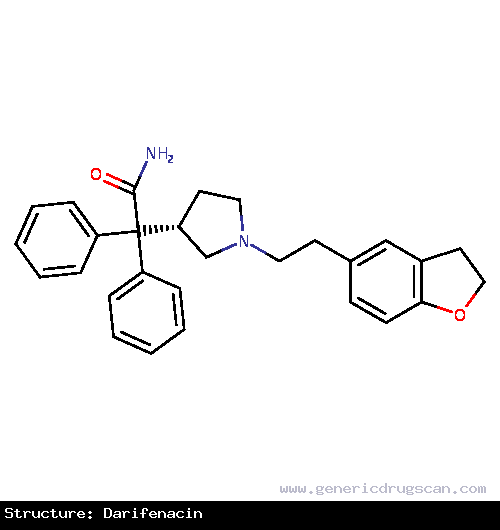Darifenacin Drug: Indication, Dosage, Precaution, Side Effect , Storage, Category Type and corresponding Brands - www.genericdrugscan.com
Darifenacin
Drug Status in USA : ApprovedDrug Status in Canada : Approved
pronunciation
pronounced as (dar ee fen' a sin)
Why is this medication prescribed?
Darifenacin is used to treat an overactive bladder (a condition in which the bladder muscles contract uncontrollably and cause frequent urination, urgent need to urinate, and inability to control urination). Darifenacin is in a class of medications called antimuscarinics. It works by relaxing the bladder muscles to prevent urgent, frequent, or uncontrolled urination.
How should this medicine be used?
Darifenacin comes as an extended-release (long-acting) tablet to take by mouth. It is usually taken once a day with plenty of liquid. This medication may be taken with or without food. Take darifenacin at around the same time every day. Follow the directions on your prescription label carefully, and ask your doctor or pharmacist to explain any part you do not understand. Take darifenacin exactly as directed. Do not take more or less of it or take it more often than prescribed by your doctor.
Swallow the tablets whole; do not split, chew, or crush them.
Your doctor will start you on a low dose of darifenacin and may increase your dose after 2 weeks.
Ask your pharmacist or doctor for a copy of the manufacturer's information for the patient.
What are the precautions to be followed?
Before taking darifenacin,- tell your doctor and pharmacist if you are allergic to darifenacin or any other medications.
- tell your doctor and pharmacist what prescription and nonprescription medications, vitamins, nutritional supplements, and herbal products you are taking or plan to take. Be sure to mention any of the following: antidepressants such as amitriptyline (Elavil), amoxapine (Asendin), clomipramine (Anafranil), desipramine (Norpramin), doxepin (Adapin, Sinequan), imipramine (Tofranil), nortriptyline (Aventyl, Pamelor), protriptyline (Vivactil), and trimipramine (Surmontil); antihistamines; clarithromycin (Biaxin); flecainide (Tambocor); ipratropium (Atrovent); itraconazole (Sporanox); ketoconazole (Nizoral); medications for irritable bowel disease, motion sickness, Parkinson's disease, ulcers, or urinary problems; nefazodone (Serzone); nelfinavir (Viracept); ritonavir (Norvir); and thioridazine (Mellaril). Your doctor may need to change the doses of your medications or monitor you carefully for side effects.
- tell your doctor if you have or have ever had urinary obstruction (a blockage of urine flowing out of the bladder), any type of blockage in the digestive system, benign prostatic hypertrophy (enlargement of the prostate), severe constipation, ulcerative colitis (a condition which causes swelling and sores in the lining of the colon
- large intestine
- tell your doctor if you are pregnant, plan to become pregnant, or are breast-feeding. If you become pregnant while taking darifenacin, call your doctor.
- if you are having surgery, including dental surgery, tell the doctor or dentist that you are taking darifenacin.
- you should know that darifenacin may cause blurred vision or make you dizzy. Do not drive a car or operate machinery until you know how this medication affects you.
- you should know that darifenacin causes decreased sweating, which may cause heat prostration (collapse because of high body temperature) in hot weather.
What are possible side effects of this medication ?
Darifenacin may cause side effects. Tell your doctor if any of these symptoms are severe or do not go away:- dry mouth
- constipation
- upset stomach
- stomach pain
- diarrhea
- weakness
- dry eyes
- difficulty urinating or being unable to urinate
- burning pain during urination
- rash
- itching
Darifenacin may cause other side effects. Call your doctor if you have any unusual problems while taking this medication.
How to store the medication and dispose it of after its use later?
Keep this medication in the container it came in, tightly closed, and out of reach of children. Store it at room temperature and away from excess heat and moisture (not in the bathroom).
Unneeded medications should be disposed of in special ways to ensure that pets, children, and other people cannot consume them. However, you should not flush this medication down the toilet. Instead, the best way to dispose of your medication is through a medicine take-back program.
Drug Category/Class
- Muscarinic Antagonists
- Antispasmodic Agents
- Drugs for Urinary Frequency and Incontinence
- Urological Agents
- Genito Urinary System and Sex Hormones
- CYP2D6 Inducers
- CYP2D6 Inducers (strong)
- CYP3A4 Inhibitors
- Drugs for urinary frequency and incontinence
| Prescribed | For the treatment of overactive bladder with symptoms of urge urinary incontinence, urgency and frequency. |
| Weight : | 426.55 |
| Structure | Darifenacin |
 | |
| Formula | C28H30N2O2 |
Darifenacin has 7 Brands listed
| Darilong (15 mg) | Darilong (7.5 mg) |
| Dariten OD (15 mg) | Dariten OD (7.5 mg) |
| Deritas (7.5 mg) | Vesigard (7.5 mg) |
| Xelena (7.5 mg) |
Search Generic Drugs alphabetically
